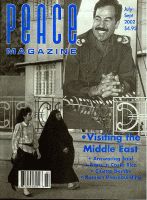
Peace Magazine Jul-Sep 2002, page 25. Some rights reserved.
Search for other articles by Douglas Roche here
This PrepComm was ominous
An exercise in frustration, the first meeting of the Preparatory Committee for the 2005 Review of the Non-Proliferation Treaty (NPT) took place in New York from April 8-19th in New York and dashed the hopes raised at the 2000 Review for serious progress on nuclear disarmament. Not only did the Nuclear Weapons States (NWS) step back from their "unequivocal undertaking" to negotiate the total elimination of their nuclear arsenals, the PrepComm could not even agree on how implementation reports will be made. Extensive wrangling over a timetable for the PrepComm meetings signaled the deep divisions persisting in the international community on the future of nuclear weapons. With the United States openly admitting that its new approach consists of nuclear and non-nuclear offensive systems and stating that it "no longer supports" some of the Practical Steps agreed to in 2000 (e.g., ABM Treaty, CTBT), the NPT has been severely wounded.
The New Agenda countries (Brazil, Egypt, Ireland, Mexico, New Zealand, South Africa and Sweden) played a strong role, protesting that there had been few advances in the thirteen Steps since 2000 and warning that, despite bilateral and unilateral reductions, the total number of nuclear weapons deployed and stockpiled still amounts to thousands. They promised to pursue, with continued vigor, the full and effective implementation of the 2000 agreements.
The subjects of nuclear terrorism, compliance by Iraq and North Korea to their NPT commitments, and the continuing refusal of India, Pakistan, and Israel to join the NPT were all given prominent attention. The International Atomic Energy Agency IAEA pointed to its $12 million voluntarily-funded eight-point plan of action to improve protection against acts of terrorism involving nuclear material and other radioactive materials.
The PrepComm took up the subject of reporting on the implementation of Article VI and the 1995 Resolution on the Middle East, but could not agree on the scope, frequency, or format of such reporting.
Fourteen statements by non-governmental organizations to the PrepComm were praised by several delegates for substance and insights.
The PrepComm ended with a seven-page "Chairman's Factual Summary" annexed to the report. The Factual Summary reflected points made at the meeting, including concern about existing nuclear arsenals, new approaches to the future role of nuclear weapons and development of new generations of nuclear weapons; and concern that the US withdrawal from the ABM Treaty and the development of missile defence systems could lead to a new arms race. This document goes forward to the Second PrepComm (2003 Geneva), but its status was immediately challenged; though the Report (with the Annex) was adopted without a vote, the US, the UK, and France made a point of insisting that the Factual Summary was only the Chair-man's "personal" statement.
Senator Douglas Roche is Chairman of the Middle Powers Initiative.

Peace Magazine Jul-Sep 2002, page 25. Some rights reserved.
Search for other articles by Douglas Roche here